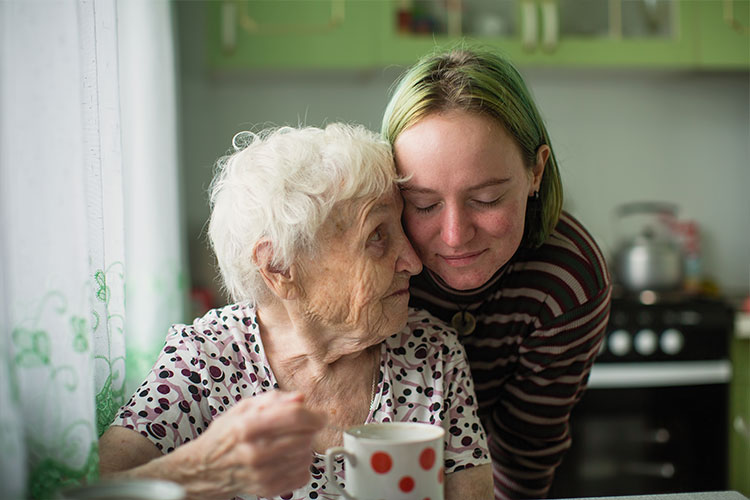As a social species, we’re hard-wired to connect with one another. Although the ways in which we prefer to socialise may be as unique as our fingerprints, it’s clear that finding those whom we can share our wisdom, interests, laughter or even just our time with helps us thrive.
But as we get older, it’s common to see our social circle grow smaller. Leaving the workplace, navigating health and mobility issues, living alone, and seeing family and neighbours move away are all factors that can make a person vulnerable to isolation.
“A lot of older people will say, ‘I'm not lonely!’, but they actually are,” explains Joanne Fitzgerald, Director of Operations, Carers, Ageing & Support Centre at The Benevolent Society. “Really, it’s that they don’t want to complain. They don’t want to be a burden.”
Seeing it from their side

In starting a conversation around loneliness with an older adult, whether that be a family member, friend, or neighbour, remember: they’re the expert on themselves.
“Listening is a big thing. By doing this you’ll be better positioned to pick-up on what they actually need, not what you think they need,” emphasises Joanne.
She recalls a family who would pick up their dad from an aged care facility every Sunday for a long lunch at their house. As they did this with his wellbeing in mind, understandably, they became upset when he started asking them to take him home early.
“Home for him was a residential facility because that’s where he felt safe,” says Joanne. “That kind of mindset isn’t uncommon. Seeing a negative news story can be enough to keep some older people from venturing out into their community. Families and friends need to know that providing safe environments is really important,” she explains.
Making moments valuable

Accommodating a loved one’s anxiety whilst supporting them to step outside their comfort zone is a balancing act, so it’s worth experimenting with numerous locations and activities. For someone with dementia, visiting a known environment, such as the local café, may be more worthwhile.
“If you give someone something you know they enjoy, like a cake or coffee, then maybe those short, regular visits are more important than being with them the whole day,” Joanne suggests.
Although we all have busy schedules, she says it’s important to consider all the ways you can include someone in your life.
“For example, you might invite your older loved one to join you while you pick up your child from soccer practice. A small and simple occasion like that can be a great diversion, even if it just involves sitting in a car, having those little conversations, sharing interaction with different generations, and going back home. Just that can make a big difference.”
Older people who still drive might even like to assist by taking the kids to watch the soccer game themselves. Likewise, if they have the ability to mind the children for an hour, prepare a meal with you (and hopefully teach you or the kids their secret recipes!) or help garden with you or a care worker, these could become great routine activities.
“You know, they've raised a family. In many cases, they've been there, done that, and then suddenly they say that they're not required as much,” Joanne says. “So, it’s about feeling valued for who they are and what they can contribute to.”
“It’s about feeling valued for who they are and what they can contribute to.”
Community care

But as a family member or friend, there’s only so much you can do. That’s why encouraging your loved one to take advantage of the various aged care services and social support programs available is vital.
“People need to have real connections with the outside community,” Joanne tells us. “Having the opportunity to go to a seniors group or get a coffee with a care worker before they assist them with their shopping is wonderful. It's a bit of an outing, it’s a bit social and they can share stories. It breaks up what can be; a very lonely day in a house,” she says.
For someone dealing with physical or cognitive disabilities, being part of a community – such as a disability service or a support group – that really understands these challenges can be lifechanging. But getting there may require a leap of faith – at least initially.
“My experience is that sometimes people are resistant to do something different. But often when they do, they say, ‘I really enjoyed that!’” explains Joanne. “It’s about first understanding the person’s story, and then making the connections that give them the ability to do the things that they want to do and mix with like-minded people,” she says.
“The Benevolent Society runs Greenwood Cottage, a day centre where people with dementia can have some respite. We have local children visit the centre, so there’s generational impact. We also have music, craft and a meal and midday transport is provided,” Joanne adds.
With restrictions easing, the team at Greenwood in Southern Sydney are working hard to see its doors reopen for all who are eager to come back. But even at home, there’s an opportunity for companionship.
“A pet can be absolutely brilliant. We all know the advantages of having a pet. People even live longer when they have something they need to get up in the morning for and feed at the end of the day – it gives them purpose,” Joanne says.
Older people have a unique wealth of wisdom and experience to share. So beyond aiding their wellbeing, connecting our loved ones to community means we all benefit from the capabilities, knowledge and treasures they have to offer. Essentially, let’s recognise and value older Australians for who they are, as they are, today.
Find out more about the Ageing services we offer here or call us on 1800 236 762.